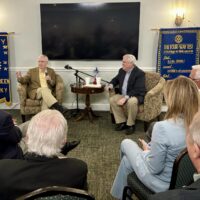The annual legislative assault on Kentucky’s open government laws has commenced, but this year with a vengeance. It is no exaggeration to suggest that the fate of the Kentucky Open Records Act is at stake.
Sponsored by Rep. John Hodgson, R-Fisherville, Rep. Jason Nemes, R-Middletown, and House Speaker David Osborne, R-Prospect, House Bill 509, establishes what The Bowling Green Daily Times once described as “a codified way to evade watchdogs, both in the press and the general public.” The bill was filed Monday.
Burying the lede
Behind a smokescreen of compliance with recent court opinions directing public agencies to assign public email addresses to “officers, employees, board members, and commission members … for the purpose of conducting the business of the public agency,” is a proposed statutory scheme that chokes public access off at its throat.
HB 509 establishes an extraordinarily high bar for determining whether a record is a “public record” subject to the open records law to begin with. In addition to the existing requirement that the record “is prepared, owned, used, in the possession of, or retained by a public agency,” HB 509 would require the record to “document, record, memorialize, or give notice to a person outside the public agency of a transaction or final action.”
Thus, unless a record is not only “prepared, owned, used, in the possession of, or retained by a public agency” but also documents “a transaction or final action,” it is not a “public record” subject to the open records law. It is, for all intents and purposes, inaccessible to the public.
Think police internal affairs investigations, consultants’ reports, petitions in support of executive pardons, public official itineraries.
Ironically, for those who might seek to hold our sitting governor and executive branch accountable through their public records, the sponsors provide a statutorily approved cloaking device.
What is and what may be a “public record”
Because the starting point for public records analysis under the open records law is determining whether the requested record is a “public record,” and because the definition of that term is radically circumscribed under HB 509, little will remain to secure meaningful public oversight.
By way of example, the sponsors identify as “public records” the following:
- Awarding, issuing, or amending a contract;
- Spending agency funds;
- Issuing a fine or penalty; or
- Issuing a public declaration or announcement of an event, occurrence, determination, or decision of the public agency.
Records, in other words, that could typically be found on a public-facing agency website.
Importantly, Hodgson, Nemes, and Osborne take it one step further, expressly excluding from the already substantially narrowed definition of public record:
- Preliminary drafts;
- Notes;
- Correspondence with private individuals, other than correspondence which is intended to give notice of a transaction or a final action;
- Preliminary recommendations or discussions;
- Scheduling matters;
- Communications of a purely personal nature unrelated to any governmental function;
- Memoranda, emails, or text messages in which opinions are expressed or policies formulated or recommended; and
- Information or documents stored or retained on a device or email account that is the personal property of a current or former employee, officer, board member, or commission member.
What are now exceptions to the open records law that a court can order the release of — if the agency fails to prove it properly denied a request — will be entirely excluded from the application of the open records law under HB 509.
The sponsors deliberately cut a wide swath through the open records law, leaving little more for public examination than lawmakers left for public examination when they excluded themselves from the open records law in 2021.
“Proponents of such measures,” The Daily News noted in its 2022 editorial, “are always ready with talking points laying out their supposed good intentions. But we’re not fooled. Amid a national political climate in which anti-media rhetoric is a cornerstone of mainstream conservative campaigning, are we really expected to believe it’s just an innocent coincidence that state Republicans are flooding the zone with a series of anti-journalism, anti-free speech and anti-transparency proposals?
“[T]he GOP’s recent track record leaves little reason to give the party the benefit of the doubt. A preponderance of the evidence suggests many Republicans have become so intolerant of scrutiny and accountability that they are willing to legislate against transparency and the First Amendment.”
And so it is with HB 509. It’s sponsors may profess good intentions aimed at addressing the pervasive use of private devices and accounts to conduct public business — a dubious argument in itself based on the language of the bill — but their aggressively anti-transparency agenda is the clear impetus for this bill.
What would remain?
In truth, nothing the Kentucky General Assembly has done in the past to chip away at foundational principles of the open records law compares with the devastation HB 509 will wreak if it is enacted into law.
Our open records law, “once a standard bearer for accountability laws,” will be hobbled by a definition of “public record” that is confined to those least likely to “cause inconvenience or embarrassment,” thereby eradicating any right to meaningful public agency oversight and divesting the public of decades-old rights that ensure we remain our own governors.
As James Madison wrote in 1822, “A popular Government, without popular information, or the means of acquiring it, is but a Prologue to a Farce or a Tragedy; or, perhaps both. Knowledge will forever govern ignorance: And a people who mean to be their own Governors, must arm themselves with the power which knowledge gives.”
Have we, at last, reached the point that the Bowling Green paper warned us about in its 2022 editorial:
“Politicians who lack the maturity or the backbone to deal with criticism or opposing viewpoints should leave public office altogether, instead of trying to rig the game in order to make their jobs more comfortable. This recurring theme in conservative politics is profoundly disappointing and frightening, and we urge reasonable-minded elected officials on both sides of the aisle to firmly oppose all such misguided and dangerous efforts to undermine our freedoms.”
Amye Bensenhaver spent 25 years as an assistant attorney general in Frankfort and is an expert on open records and open meetings. Now out of state government, she writes about these issues. Bensenhaver is a co-founder of the Kentucky Open Government Coalition with Jennifer P. Brown, who is the editor of Hoptown Chronicle.






